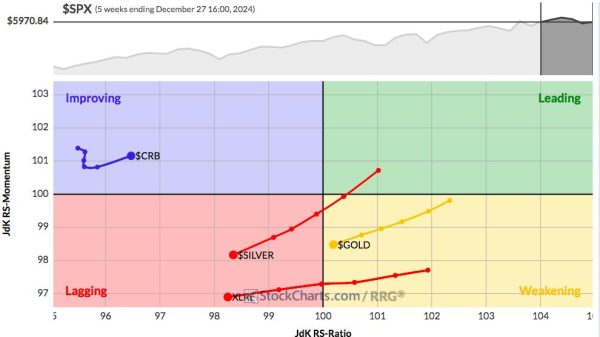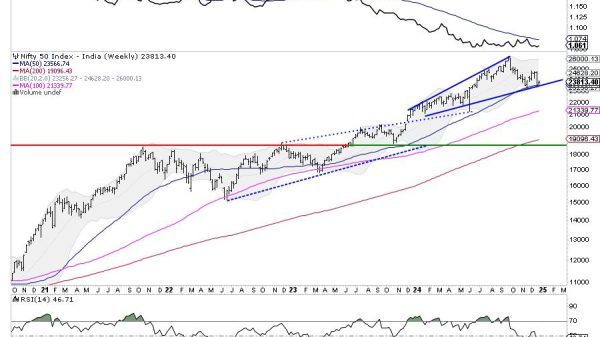The Political Economy of Distributism: Property, Liberty, and the Common Good
by Alexander William Salter
Catholic University of America Press, 2023; xiii + 238 pp.
Distributism attracted considerable attention during the 1920s and ’30s among people who wished to apply Catholic social teaching to the modern capitalist economy, and it has recently had a revival. The appearance of The Political Economy of Distributism is particularly welcome for those seeking further information about distributism.
The author of the book, Alexander William Salter, an economist who teaches at Texas Tech University, is favorable to the free market but also sympathetic to distributism, and readers could not ask for a better guide. If after reading the book we find less value in a number of distributist proposals than Salter does, it is not for want of trying on his part to make the best case possible for them.
Hilaire Belloc (1870–1953) and G. K. Chesterton (1874–1936) are the two best-known distributists, and Salter devotes two chapters to each one after briefly introducing the distributist movement. He also includes two chapters on Wilhelm Röpke (1988–1966), who, though not a distributist, was influenced by the movement and may be viewed as having carried it forward. Salter also has a brief and helpful chapter on Catholic social teaching (to which he is sympathetic, although he is Orthodox and not Roman Catholic); a chapter that evaluates distributism in the light of contemporary political economy; and a conclusion that suggests ways to advance the distributist project further.
Distributists want farmland to be widely available and oppose control of the economy by monopolistic capitalist firms. Though in their criticisms of monopoly capitalism they can sound like Marxists, distributists oppose socialism and the welfare state, which they contend are inimical to human personality and the family. Salter writes:
Belloc sees various social-welfare proposals, such as mandatory insurance and minimum wages, as inherently servile. Each of these proposals would further enshrine in law the distinction between the employer and employee classes. Legal categories would force patronship on capitalists and clientelism on proletarians, a situation bearing a striking resemblance to ancient-world servility. Western society had advanced from status to contract; the spirit of these laws pushes it backwards.
Although, as Salter reminds us, F.A. Hayek cites Belloc in The Road to Serfdom, his analysis of capitalism is deficient, and of this Salter is well aware: “Belloc argues that the race among producers to extract ‘surplus value’ from workers necessarily creates industrial chaos.” Also, because workers do not have access to productive resources, Belloc contends, they must accept the hard bargains that capitalist employers offer them and are thus exploited. As Salter notes, there is no basis for the view that labor is the sole source of productive value and that the income of landlords and capitalists comes from the “surplus value” that is extracted from workers:
The standard economic theory that explains what labor earns in the market (along with capital and land) is marginal productivity theory. In brief, the factors of production receive the value they contribute to the production process. . . . If workers were systematically undercompensated (paid less than the value they add to the productive process), there is an opportunity for firms to hire workers at a slightly higher wage, depriving the underpaying firms of a source of profits and capturing those profits for themselves.
Belloc would respond that capitalist monopolies aren’t subject to competitive pressures to raise wages (i.e., in the language of modern price theory, they have “monopsony” power). But as Salter points out:
While there is nothing wrong with bargaining models in specific employment contexts, by itself this does not mean one party can dictate terms to the other. Neither employers nor employees are immune to reprisal. The existence of feasible alternatives makes strong-arm tactics impractical for either party.
Although Salter is fully cognizant of the deficiencies in Belloc’s analysis of the free market, he defends Belloc with a weak argument. Salter suggests that although many of the interventions Belloc favors in the market may reduce prosperity, the price is worth paying because it is desirable that people have wide access to productive resources:
One way of interpreting Belloc is that he means the low prices for consumer goods under capitalism do not reflect the full costs of their production. We may be giving up fewer economic resources to produce these goods under capitalism than under distributism, but we are consuming more political resources, and this is not reflected in the pricing process. Low capitalist prices do not take account of the fact that the production methods used, by concentrating property in the hands of the few, result in a widespread loss of freedom. . . . Capitalist economics have political externalities: this is Belloc’s claim expressed as concisely as possible. (emphasis in original)
This assumes without adequate justification that those who don’t have productive resources but want to acquire them would be unable to do so in the free market. If you are an industrial worker and want to buy a farm, what prevents you from doing so? Is it the high price? Then what prevents you from joining with other workers to pay it? Is the issue that we can imagine circumstances in which the price of land would be lower? If so, it is Salter’s task to describe these circumstances and to establish their normative relevance.
I suspect that the key argument is not that workers can’t acquire land in a free market but that they haven’t been willing to pay the price. If workers don’t want to become farmers, they, or at least a large number of them, should want this. This, Salter’s might say, is no mere subjective preference but represents the application of Thomist natural law ethics to contemporary capitalism (see in this connection Salter’s interesting remarks about Mary Hirschfeld’s book Aquinas and the Market). The problem with this contention, from a Rothbardian standpoint, is that people who don’t want to be become independent farmers aren’t violating anyone’s rights and may not be compelled to become farmers.
The criticisms of the argument about the alleged lack of access to productive resources apply to Chesterton and Röpke as well. Like Belloc, Chesterton wanted to interfere with the free market to promote the outcomes he thought best. Laws that imposed taxes on chain stores, for example, did not “really” restrict freedom. Salter acknowledges that Chesterton’s rationale for these laws, and others like them, is nonsense and that Chesterton knew little about economics. Röpke, an outstanding professional economist, argued forcefully for the virtues of economic freedom, but at times he did not resist the temptation to tweak the free market to promote the sort of small communities he deemed best.
Salter is entranced by Chesterton’s style and rightly draws attention to his magnificent tribute to the family. He was able to use paradox to throw unexpected light on issues, as in his magnificent demolition of eugenics. (For an excellent analysis of Chesterton as a writer, see Hugh Kenner’s Paradox in Chesterton.) I hope that many readers of Salter’s account will be encouraged to read Chesterton; by no means do I wish to emulate the “Remote and ineffectual Don / That dared attack my Chesterton” of whom Belloc wrote.
Salter hopes that distributism will become a progressive research program, but, for reasons best stated in Thomas Woods’s article “What’s Wrong with ‘Distributism,’” this is a hope I cannot share. A popular ballad after World War I asked, “How ya gonna keep ’em down on the farm / After they’ve seen Paree?,” and I do not think the distributists have a good answer.























